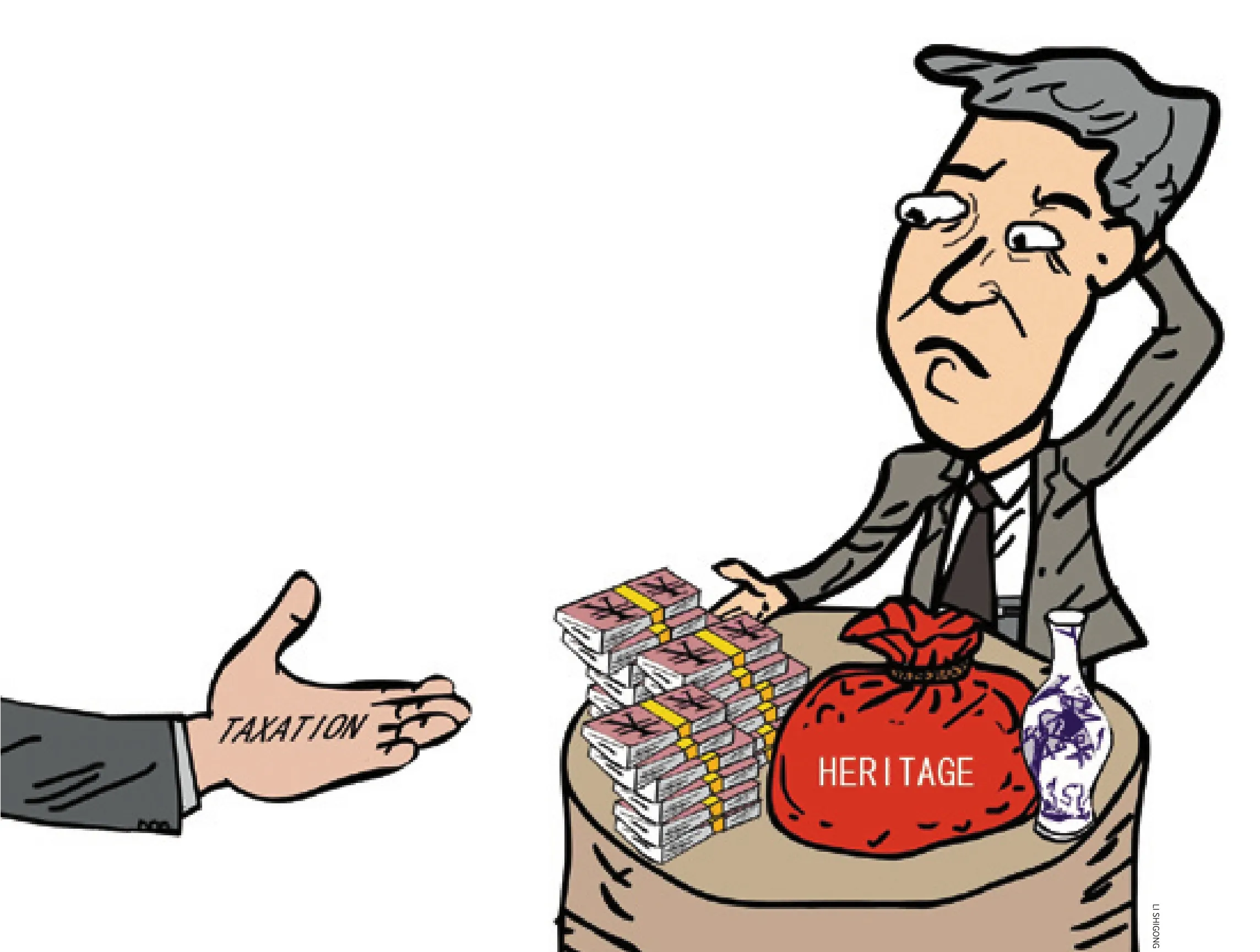Should China Levy an Inheritance Tax?
2013-12-06
According to research by Beijing Normal University on wealth distribution, China should levy an inheritance tax when at least 5 million yuan ($800,000) is passed down.
The result of a survey done by China Youth Daily on whether the country should start collecting the tax shows that 48.46 percent of the 11,203 people surveyed opposed the idea while 34.04 were in favor. The remaining 17.51 percent remained neutral on the subject.
In an interview, Zhang Xiaojie, head of the State Administration of Taxation, said, three problems need to be solved. First, society needs consensus on the collection of the tax; second, there should be a timetable for the procedure; third, various other problems need to be dealt with.
The topic has aroused a heated debate. The following are excerpts of opinions:
OpponentsLiao Xiaojun (Guangzhou Daily):It is still too early to collect inheritance tax in China. It would do more harm than good to the economy.
Assets of most local private entrepreneurs are used as business operation capital.According to common practice in other countries, such capital is exempted from inheritance tax or enjoys a preferential rate.
Most private business people, still in the prime of their lives, would take many years to leave their assets to their heirs. Such a tax would affect economic growth and lead to the out flow of capital.
Moreover, inheritance tax is regarded internationally as complex. It is even harder to implement in China while the personal asset declaration and registration system remains incomplete.
Feng Haining (China Youth Daily):Obviously,the issue needs to be decided by the National People’s Congress through legal procedures while taxation authorities connect with banks as well as housing organizations.
Moreover, before levying estate tax, we should take into consideration general tax levels in China.If the purpose is to increase the country’s tax revenues, inheritance tax would be hard to accept.
Double taxation is already common in China,with high indirect tax, about which taxpayers are complaining. Therefore, if inheritance tax is to be levied, it is necessary for the Central Government to first reform the current taxation system and lower the overall tax burden of the people. Otherwise, it is improper to add any new taxation items. Also, due to cultural differences, it’s relatively easier to collect inheritance tax in other countries compared to China, where parents want to leave their assets to their children.
Wei Wenbiao (Dahe Daily):Inheritance tax could bring negative results. For example, some would transfer their assets to their children when the latter are still very young. In some cases, millionaires and billionaires even transfer their capital to countries with low tax rates, causing an outflow of Chinese wealth.
To some extent, the collection of inheritance tax will hit people’s enthusiasm to create wealth.As we know, the desire to accumulate wealth for future generations is a strong driving force, particularly in China, where the market economy is still young. The collection of inheritance tax might have a more negative than positive impact on national economic development.
The concentration of family wealth will help it to invest and develop businesses. If such an endeavor collapses because of the loss of wealth in the name of an inheritance tax, society would bear the brunt. While working to develop China’s market economy, family wealth accumulation should never be hurt.

Supporters
Shi Ying (Legal Daily):China is ready to start the collection of inheritance tax. By the end of 2010, it had already been home to 960,000 magnates who possess tens of millions of yuan and 60,000 with hundreds of millions, up by 9.7 percent and 9.1 percent over 2009 respectively.The two groups’ average ages are 39 and 43.
With the local rich and poor gap widening, collecting inheritance tax is a means to balance wealth distribution within society. People are supposed to have a fair starting point to the largest extent.Personal income tax surely is also a leverage to balance income distribution, but it is unable to handle a person or a family’s existing wealth from their parents or grandparents. Inheritance tax, however,is able to make up for this loophole in the system.The goal is to reach equality in redistribution by adjusting wealth accumulated within a certain period of time.
Zhu Jimin (www.people.com.cn):Inheritance tax is among the most suitable means used in a market economy to narrow the income gap and solve related social problems.
There is a huge amount of wealthy people to be targeted in Chinese society for inheritance tax collection. The income gap keeps widening.When the offspring of wealthy people inherit huge amounts of wealth, they are generally put in an advantageous state, and don’t need to work as hard as the rest to live a much more comfortable life than others. This situation is going against the principle of becoming rich through hard work.When inheritance tax begins to be collected, surely many rich people will choose to donate some of their wealth to charity and in this sense, help boost China’s charitable cause. Such tax revenues can be used to better help low-income people.
Wang Zhenyao (China Youth Daily):With the development of the Chinese society and economy, whether to collect inheritance tax has been put on the agenda. The country should learn from developed states in this regard. For example,progressive income tax can be adopted which,during economic difficulties, can be adjusted. China is already working in this direction. I personally feel that, objectively, the collection of inheritance tax offers protection to rich people and their families. ■
